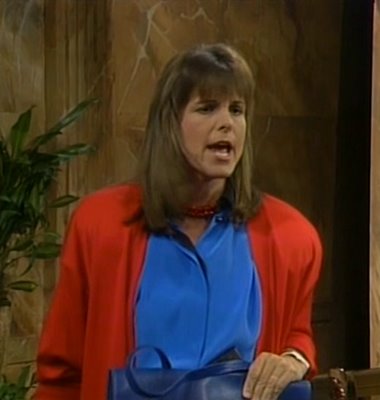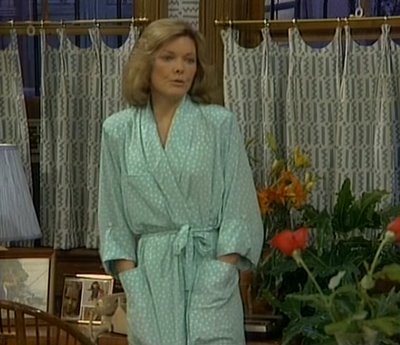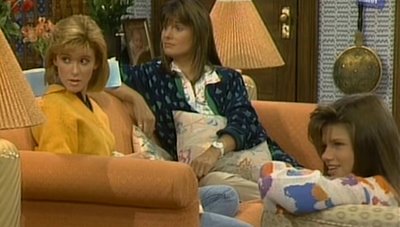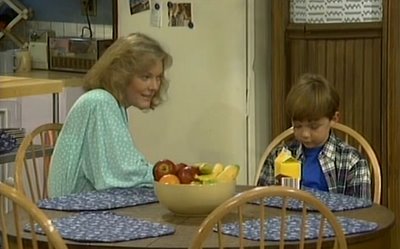 American newspaper ad for a brand new comedy series - Kate & Allie, 1984.
American newspaper ad for a brand new comedy series - Kate & Allie, 1984. Created by Sherry Coben, Kate & Allie was a groundbreaking and tremendously likeable American sitcom, which debuted in the States in 1984 and in England (on Channel 4) in 1986. The show told the story of two women who had first met as kids.
Created by Sherry Coben, Kate & Allie was a groundbreaking and tremendously likeable American sitcom, which debuted in the States in 1984 and in England (on Channel 4) in 1986. The show told the story of two women who had first met as kids.Baby boomers Kate McArdle (Susan Saint James) and Allie Lowell (Jane Curtin) were high school friends, but later drifted apart. Let loose upon the "Peace and Love" scene of the 1960s, Kate became a free wheeling, peace loving, protest marcher - and married an actor. Meanwhile, Allie became a neat suburban housewife - she married a doctor.
In 1984, now both divorced, Kate and Allie merged their two families - comprising Kate's teenage daughter, Emma (Ari Meyers), Allie's teenage daughter, Jennie (Allison Smith), and her younger son, Chip (Frederick Koehler).
Kate's apartment in Greenwich Village, New York, was now home to everybody, and we had an interesting alternative family set-up.
Creator Sherry Coben had been inspired by a high school reunion she had attended, where she observed a couple of unhappy divorcees who found comfort in sharing with each other. One of the most groundbreaking things about Kate & Allie was that the show never became some trendy, issue-led thing, Feminist ideology brainwashing or 'hey - this is hip and happening - let's do it!' garbage - as some previous shows had done.
Kate was laid back and happy-go-lucky, able to cope (well, usually!) with Allie's well-ordered suburban ways and occasional hysterical outbursts.
All was not portrayed as eternally peaceful in this alternative family, but Kate and Allie's friendship won through.
 Could there be life after marriage for Allie, seen here with her ex-husband, Dr Charles Lowell (Paul Hecht)? She had still to meet Claire (Wendie Malick), the woman Charles had left her for, and when she finally did, the news that Charles and Claire had made love in Allie's marital bed, before the marriage had broken up, on Allie's designer sheets with the motif of little windmills, stunned her. Charles, meanwhile, was unhappy when Claire presented him with a new baby son, Stewart. Wasn't he too old for this? Didn't he deserve some peace and a nicely paced life which suited his age?
Could there be life after marriage for Allie, seen here with her ex-husband, Dr Charles Lowell (Paul Hecht)? She had still to meet Claire (Wendie Malick), the woman Charles had left her for, and when she finally did, the news that Charles and Claire had made love in Allie's marital bed, before the marriage had broken up, on Allie's designer sheets with the motif of little windmills, stunned her. Charles, meanwhile, was unhappy when Claire presented him with a new baby son, Stewart. Wasn't he too old for this? Didn't he deserve some peace and a nicely paced life which suited his age? A landmark episode in this groundbreaking series, Kate and Allie face a huge rent increase when the landlady discovers that her one family apartment is now occupied by two families. Our heroines seek to wriggle off the hook by claiming to be a lesbian couple, winning the landlady's sympathy as she is herself gay. But the truth finally outs in a thought provoking scene which poses the question: just what constitutes a family? Is it only Mr and Mrs Average and 2.4 kids? The answer is - of course not!
A landmark episode in this groundbreaking series, Kate and Allie face a huge rent increase when the landlady discovers that her one family apartment is now occupied by two families. Our heroines seek to wriggle off the hook by claiming to be a lesbian couple, winning the landlady's sympathy as she is herself gay. But the truth finally outs in a thought provoking scene which poses the question: just what constitutes a family? Is it only Mr and Mrs Average and 2.4 kids? The answer is - of course not! Peace, love and protest were Kate's scene as a student in the 1960s. In the 1980s (just look at those shoulder pads!), she tried to rally her fellow customers at the local bank to protest at the establishment's attitude towards its customers, but was quickly removed by security guards!
Peace, love and protest were Kate's scene as a student in the 1960s. In the 1980s (just look at those shoulder pads!), she tried to rally her fellow customers at the local bank to protest at the establishment's attitude towards its customers, but was quickly removed by security guards! Whilst Kate worked for a travel agent, Allie was at first housewife homebody, though later returned to college to get a degree. Kate commented that Allie had saved Emma (and herself!) from being latchkey kids.
Whilst Kate worked for a travel agent, Allie was at first housewife homebody, though later returned to college to get a degree. Kate commented that Allie had saved Emma (and herself!) from being latchkey kids. Note the strange design of the matching wallpaper and curtains. Dot. line. Squiggle. Dot. Was it some kind of code, I used to wonder?
Also note that Allie has shoulder pads in her dressing gown!
 Emma decides to make divorce the subject of her "Our Changing World" high school project, and finds the best subject material is to be found at home.
Emma decides to make divorce the subject of her "Our Changing World" high school project, and finds the best subject material is to be found at home. Kate found romance with Ted Bartelo (Gregory Salata), a plumber who was afraid of spiders. The two fell deeply in love, but split up repeatedly, realising that they both wanted different things out of life - Ted a family, Kate a continuation of her career. Finally, Ted found somebody who wanted the same things as him. Kate was devastated.
Kate found romance with Ted Bartelo (Gregory Salata), a plumber who was afraid of spiders. The two fell deeply in love, but split up repeatedly, realising that they both wanted different things out of life - Ted a family, Kate a continuation of her career. Finally, Ted found somebody who wanted the same things as him. Kate was devastated.Kate and Allie was well written, and imaginative: one episode began as reality, before becoming Allie's imagination - something we only began to suspect as the plot became more and more bizarre; another saw Chip returning to the about-to-be-demolished apartment in the early 21st Century with his son and reminiscing about his childhood there in the 1980s; a further stand-out-in-my-mind episode centred on Chip - and soon his entire alternative family - befriending Louis, a young homeless man with learning difficulties.
 Louis (Michael Countryman) found friendship and sewing lessons at Kate and Allie's apartment. The character was rehoused in supported living accommodation and developed romantic feelings towards Kate, before finding happiness elsewhere.
Louis (Michael Countryman) found friendship and sewing lessons at Kate and Allie's apartment. The character was rehoused in supported living accommodation and developed romantic feelings towards Kate, before finding happiness elsewhere.Kate & Allie ran until 1989 - by which time Allie had remarried. Her new husband was a man called Bob Barsky (Sam Freed) who spent each week working away as a TV sportscaster, returning home only at weekends.
So, Kate moved into Allie's marital home to keep her company.
It wasn't the same. Perhaps it was the absence of the "Dot. Line. Squiggle" wallpaper at the new place, perhaps all the angles had been covered, but it soon became clear that Kate & Allie had run its course. The original premise of two divorced women merging their households had been groundbreaking; the set-up of the final series - divorced woman living with married friend and her often absent husband - was different, but not fascinating.
However, the show at its best was, in my very humble opinion, excellent and even towards the end, with the "Dot.Line.Squiggle" wallpaper sadly absent, there was some highly imaginative writing and the characters remained as likeable as ever.
Fondly remembered!
















5 comments:
A lovely series. The two leads were brlliantly matched. Thought provoking, groundbreaking, the works. I note that today's priggish TV historians hate to call anything from the '80s groundbreaking, but this, The Golden Girls and Roseanne certainly were!
I loved the family-merging set up, to form one family and provide some stability for the kids. Divorce often hurts. But this was making the best of things.
The children were characters in their own right, and the way their mothers' divorces affected them a central part of the plot. The episode "Chip's Divorce", featuring Allie's nine-year-old son, Chip, was briliant. Frederick Koehler was a brilliant child actor!
Yes, he was excellent. I also recall certain tensions between Jennie and Emma at school and at home as they adapted to being alternative family sisters, Emma missing her somewhat feckless Dad, and Jennie confessing that she pretended to like her father's new wife so that she could spend time with him. The youngsters in the show were excellent
Under appreciated series, this one. I loved Louis, the mentally handicapped guy, and the whole damn thing - apart from a few naff episodes. But hey - every series has them!
Post a Comment